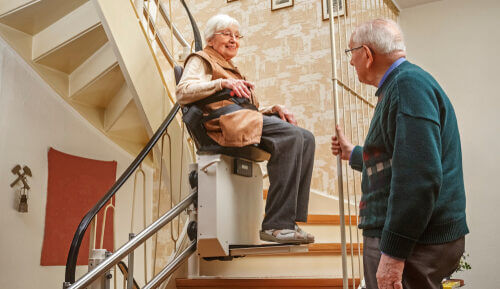
Page contents
- How do I pay for home adaptations in England?
- Do you need a care needs assessment first?
- What are minor home adaptations?
- Minor adaptations are paid by by your local council in England
- What if you live in social housing?
- What are major home adaptations
- How do I apply for a Disabled Facilities Grant?
- Home Improvement Agencies
Page contents
- How do I pay for home adaptations in England?
- Do you need a care needs assessment first?
- What are minor home adaptations?
- Minor adaptations are paid by by your local council in England
- What if you live in social housing?
- What are major home adaptations
- How do I apply for a Disabled Facilities Grant?
- Home Improvement Agencies
How do I pay for home adaptations in England?
If you’re an older person or are living with a disability in England, paying for home adaptions could make it easier for you to carry out daily tasks and live more comfortably.
With that being said, home adaptations can be costly, and often people are unsure about who is responsible for authorising these changes and the financial support they may be entitled to. This article tells you how to pay for home adaptations in England.
Do you need a care needs assessment first?
Unless you’re able to pay for home adaptations yourself in a home that you own in England, you will need a care needs assessment before you can get the ball rolling.
A care needs assessment is carried out by your local council and will look at your health, wellbeing and living situation to determine what type of social care you would benefit from, including how to make your home more suitable for you.
Care needs assessments are free and can be arranged by contacting your local council, however there can be a waiting period, so try to get in touch as soon as you can.
If you don’t believe you need any additional support, it is possible to arrange a stand alone home assessment to work out if you can get any help with paying for home adaptations in England.
Home assessments are free and are carried out by an Occupational Therapist. They will take a look around your home with you and work out where you could benefit from adaptations.
You will be referred for a needs assessment if the visiting professional believes you would benefit from further support. For this reason it is often worthwhile to apply for a needs assessment to begin with in order to avoid delays in getting the support you need.
You can arrange a home assessment through the government website.
What are minor home adaptations?
Minor adaptations are non-structural changes to your home.
This includes things like:
- Bath boards
- Shower seats
- Grab rails
- Stair rails
- Small ramps or steps
Under the Care Act (2014), local authorities in England cannot charge for minor home adaptations that help a person to carry out daily tasks and living.
Minor adaptations are paid by by your local council in England
This means that minor home adaptations will be funded by your local council. This is usually at a cost of £1000 or less (per adaptation) and isn’t impacted by your personal financial situation, i.e., you will not be means tested to determine if you’ll be eligible.
Some councils will carry out minor adaptations without a care needs assessment, but this will depend on where you live in England as well as your individual circumstances.
What if you live in social housing?
If you live in social housing, minor home adaptations may be managed differently.
For example, a housing association might act as a private landlord and in this case they will ask you to apply to your local council for adaptations.
Alternatively, some housing associations have their own funds available for home adaptations. If this is the case, depending on your needs, your housing association may either pay for the adaptations, or they may decide that it’s not financially beneficial to adapt your house and will instead put you on a waiting list for a house that’s already been adapted.
If you are a housing association tenant and require home adaptations, you should contact your association to find out what their policies are.
What are major home adaptations
Major home adaptations cover anything that changes the structure or layout of your home.
This includes things like:
- Replacing a bath/shower with an accessible wet room
- Fitting a downstairs bathroom
- Widening doorways
- Fitting a stairlift
- Fitting low level kitchen units
- Improve access to your home
Funding major home adaptations can be more complicated, but there is help available.
What is a Disabled Facilities Grant?
There are ways to pay for home adaptations in England. One way is with a Disabled Facilities Grant that helps fund the cost of changes to your home if you are living with a disability. It’s available in England as well as Wales and Northern Ireland.
The grant is means tested, which means the amount you get will depend on your income and any savings you have, but it won’t affect any benefits you receive.
If you’re eligible, you’ll receive up to £30,000 depending on the adaptations you need.
When your application has been approved, the council will discuss with you how the grant will be paid.
This can be done in a number of ways:
- In instalments as the work progresses
- In full at the time of completion
Payments may be made directly to the contractor who is carrying out the work, or the council will send you a cheque to pass on the contractor.
If you live in rented or social housing, your application won’t be treated any differently, but if you are approved for a Disabled Facilities Grant, you’ll need to seek permission for any adaptations from your landlord or housing association.
How do I apply for a Disabled Facilities Grant?
You can apply for a Disabled Facilities Grant directly through your local council here.
If you would like more information about your eligibility and how the Disabled Facilities Grant could work for you,
Foundations has a self-assessment tool on its website where you can see if you’ll be eligible for a Disabled Facilities Grant and how it might work for your specific circumstances.
Disability benefits
If you’re not eligible for a Disabled Facilities Grant, try to make sure that you’re receiving all of the benefits you are entitled to. This additional income could help contribute towards the cost of any adaptations you need.
Depending on your circumstances, you might be entitled to:
- Attendance Allowance
- Disability Living Allowance
- Personal independence Payment
- Universal Credit
Home Improvement Agencies
Across England there are over 200 Home Improvement Agencies. They are also known as Care & Repair and Staying Put Schemes.
Home Improvement Agencies are not-for-profit organisations which offer support to people who are older, disabled or vulnerable.
They do this through a range of services including:
- Providing advice and information on suitable housing options
- Supporting with home adaptations – including attaining financial aid and planning and seeing the works through
- Carrying out home repairs
- Hospital discharge and reablement
- Helping to make your home more energy efficient
- Providing advice on the financial support available to you, including benefits
You can find your local Home Improvement Agency here.


